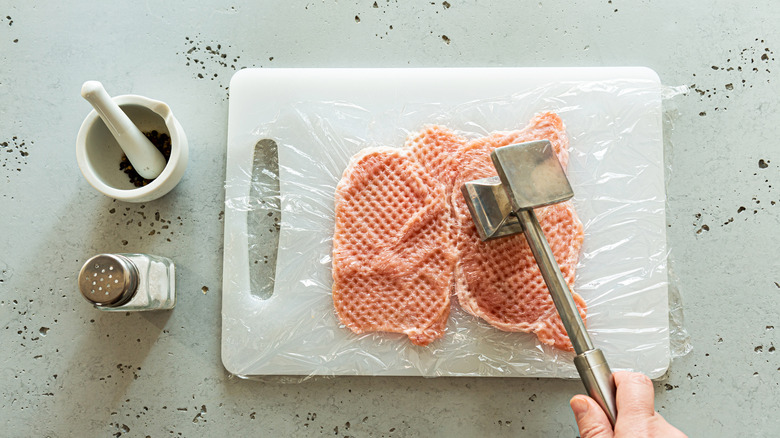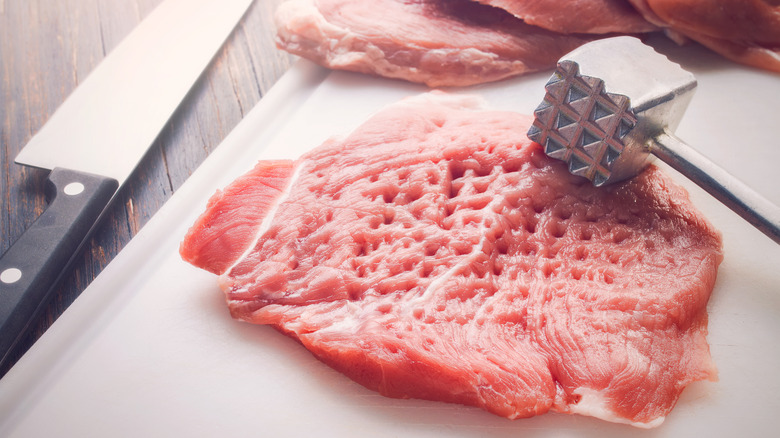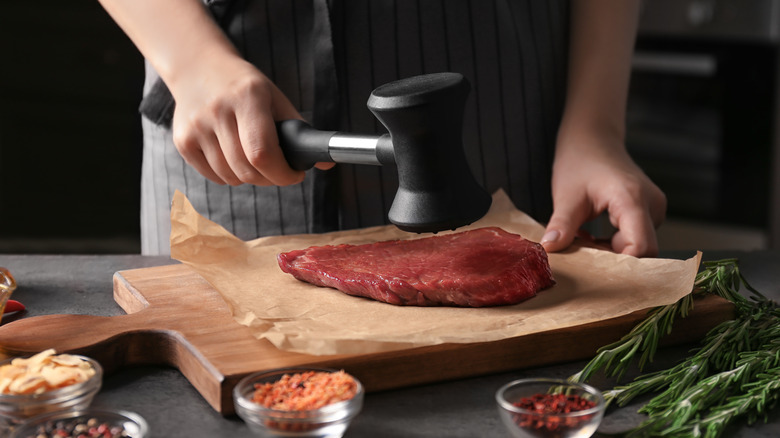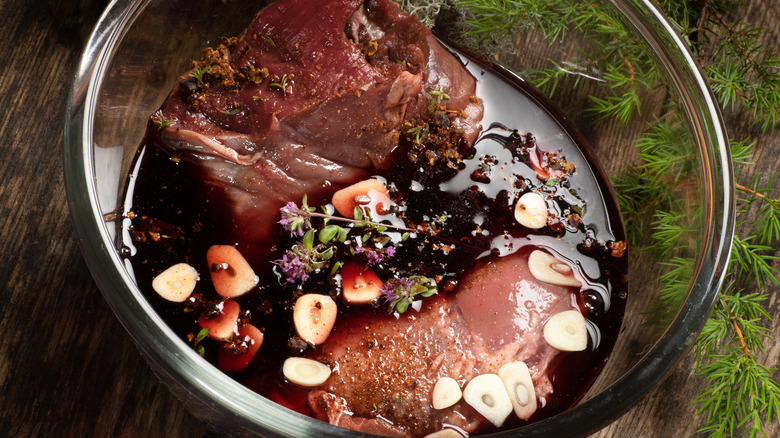The Key To Cooking Lean Meat Without Drying It Out
Even though dietary fat may not be as big a demon as the Sugar Association made it out to be, many folks may need to consume less fat for their own reasons. Lean meat options are aplenty in supermarket meat cases, from more affordable poultry options like chicken and turkey breasts, to leaner cuts of beef, lamb, and pork.
However, this lack of fat means that the meat isn't as naturally juicy, thus causing it to be dry and tough when improperly prepared. Poultry breasts are especially notorious for this, because the proteins in meat shrink when heat is applied, making the meat dry as the moisture gets cooked off. Thankfully, there is one easy way to ensure that lean cuts of meat come out as juicy as possible every time!
Meat can be mechanically tenderized — that is, you can physically affect the structure of the meat with the appropriate kitchen tools. If the meat hasn't been cooked yet, consider pounding the meat with a meat mallet. This breaks up the muscle fibers and evens out the thickness of the cut of meat. This is especially useful for meats that need to cook quickly when breaded and fried, like thin Wiener schnitzels.
Prepping for pounding meat
So how exactly do you tenderize meat with a meat mallet? First of all, if your meat is fully thawed or at room temperature, place it back in the fridge for about 30 minutes to firm it up slightly. In the meantime, find a stable surface to work on. Built-in counters are a better bet than tables, just be sure to choose a surface that isn't wobbly.
Remove the meat from the fridge and trim off any fat, sinew, and skin. Doing this after chilling and not before is important, as it will be easier to hold on to the firmer meat with your hands and manipulate it with a knife. After trimming, slice the meat into the required portions. If using poultry breasts, slice along the grain. If using thicker, tougher cuts, especially of red meat, slice across the grain. This is so that the meat doesn't tear when pounding.
How to properly pound meat
If you only have a wooden chopping board, place the meat in a resealable freezer bag, which will be thick enough to not tear. If all you have is plastic wrap or parchment, use several layers to sandwich the meat. Using the smooth side of the mallet, pound the meat firmly but gently in an outward motion until it reaches the required thickness. You can rotate the meat as you pound to get an even thickness, or flip it over halfway through and pound from the other side.
If you have a plastic chopping board — especially if you're working with a tougher piece of meat — you can place the meat directly on the board. This time, you can use the textured side of the meat mallet to pound the meat. The reason not to use this side of the mallet otherwise is because the meat or the plastic wrap may tear.
In the absence of a meat mallet, you can opt to use a heavy rolling pin or even a pestle from a mortar and pestle set. Be sure to pay more attention during pounding, as these implements can be heavier than some meat mallets.
Once you're done pounding the meat, season it with your preferred ingredients and cook it fast over high heat. Voila, tender meat!
Marinades and brines also tenderize and add flavor
Another way of using kitchen tools to tenderize meat is by using a knife. Before cooking, consider scoring the meat against the grain to break up the muscle fibers. If the meat has already been cooked, resting it and then slicing meat against the grain is the best way to get a more tender bite.
Marinating or brining can also be done to tenderize meat. This differs from the previous methods, as this requires you to manipulate the meat chemically, compared to mechanically doing so. The acid and salt in marinades and brines tenderize meat by denaturing its protein fibers. The flavors in said marinades and brines then become welcome bonuses to spice up the meat — think of how yogurts and citrus juices help tenderize meat and also lend their flavors to them. A win-win situation for all! However, remember that you should not marinade or brine your meats for too long, as marinades can make the meat far too tender to be enjoyable.
If you're especially short on time, pineapple juice or baking soda will work as tenderizers in a pinch. Pineapple juice contains an enzyme called bromelain that works by dissolving collagen fibers, which is why your tongue feels funny after too much pineapple! On the other hand, baking soda works by stopping the meat proteins from seizing up during cooking, which means the juices stay in the meat and don't leak out.



